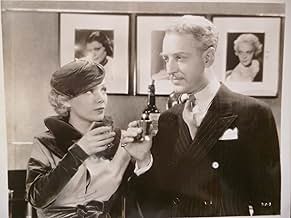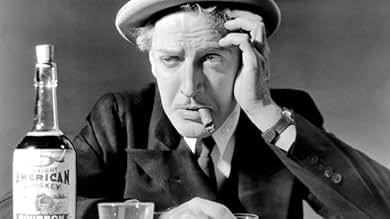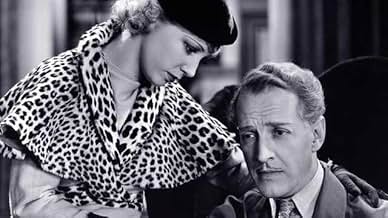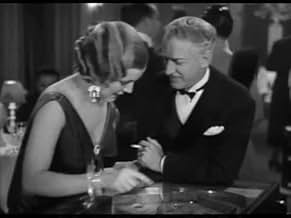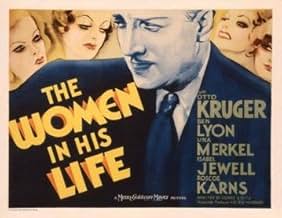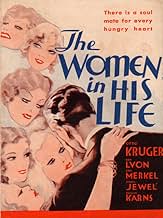A brilliant, successful criminal defense attorney's life is turned upside down when he takes on a case of a murdered woman who turns out to be an old flame who left him 10 years ago.A brilliant, successful criminal defense attorney's life is turned upside down when he takes on a case of a murdered woman who turns out to be an old flame who left him 10 years ago.A brilliant, successful criminal defense attorney's life is turned upside down when he takes on a case of a murdered woman who turns out to be an old flame who left him 10 years ago.
Don Brodie
- Reporter
- (uncredited)
Claire Du Brey
- Mrs. North
- (uncredited)
George Guhl
- Mr. Willis
- (uncredited)
Robert Homans
- Cop
- (uncredited)
Olaf Hytten
- Page
- (uncredited)
- Director
- Writer
- All cast & crew
- Production, box office & more at IMDbPro
6.3274
1
2
3
4
5
6
7
8
9
10
Featured reviews
like the premise
Kent Barringer (Otto Kruger) is a self-assured cynical womanizing successful defense lawyer. He gets another guilty man off. He uses every trick to win his cases. He keeps a picture of an old flame to remind him that love is an illusion. He gets a case defending a supposed innocent murderer. He is shocked to find the victim to be his pictured ex.
This is a pre-Code drama. I really like the premise and the start. I would like a more dashing and younger lead. Otherwise, Otto Kruger is pretty good. I don't buy the doppelganger defense. Everybody has a doppelganger. Kent didn't actually prove anything. As for the big case, I thought he would do more investigating after the loss. The second half is not as compelling.
This is a pre-Code drama. I really like the premise and the start. I would like a more dashing and younger lead. Otherwise, Otto Kruger is pretty good. I don't buy the doppelganger defense. Everybody has a doppelganger. Kent didn't actually prove anything. As for the big case, I thought he would do more investigating after the loss. The second half is not as compelling.
Kruger Is Practically The Whole Show
Otto Kruger is a top defense lawyer. He's also a ladies' man who works his adoring staff of secretary Una Merkel, co-counsel Ben Lyon, and investigator Roscoe Karns hard. He has taken on the defense of Samuel S. Hinds at the behest of Irene Hervey, when he learns something startling about an old flame. He goes on a bender and has a breakdown on top of that. Lyon takes over the case, and Hinds is convicted and sentenced to death. Kruger says he'll get him acquitted on appeal.... and then does nothing that anyone can see.
It's practically a one-man show for Kruger in various modes; during his recovery from his breakdown he gives the impression of a man who has aged thirty years on sheer acting chops. Even the usually rambunctious Karns and Miss Merkel don't do much to distract from him. While there are some issues in the denouement sequences, George Seitz acquits himself well in his first credit as a director at MGM, by sticking to Kruger.
It's practically a one-man show for Kruger in various modes; during his recovery from his breakdown he gives the impression of a man who has aged thirty years on sheer acting chops. Even the usually rambunctious Karns and Miss Merkel don't do much to distract from him. While there are some issues in the denouement sequences, George Seitz acquits himself well in his first credit as a director at MGM, by sticking to Kruger.
Otto Kruger at his best!
This movie would have been mediocre at best had it not been for Otto Kruger's performance. His acting in this movie is so natural, so unlike most precode acting where the acting is over dramatic. I honestly kept wTching just for him, he totally drew me in.
Above average crime melodrama
Otto Kruger stars as a gifted criminal defense lawyer, Kent Barringer, in this well directed and fast paced crime drama. Barringer is a troubled, cynical man, who's wife left him ten years before for another man. He must now face his past when he is shocked to discover that his ex-wife was the victim of the man that he's defending for murder. This is a well plotted little budget film with an excellent cast, with MGM's usual first-rate production values. Staring along with Kruger, are old pro's like Una Merkel, Roscoe Karns and surprisingly Isabel Jewell, usually typecast as a gum chewing bimbo -- here getting to play a good girl with brains.
Slightly uneven with weak ending
This is part love story and part courtroom drama. Otto Kruger plays, Kent Barringer, a supremely confident trial lawyer who just can't lose, but is ultimately selfish and soulless. A woman begs him to work Pro Bono on the case of her father who is accused of murder, but after promising to do so, Kruger ignores her. When he finally gets around to reviewing the facts of the case, he realizes he is connected with it in a very personal way, and this realization ultimately leads him to a new approach on life.
The film is entertaining but a bit too melodramatic and fantasy-bound for my tastes. Kruger is proficient in his role and great fun to watch. I look forward to seeing more of his work since is the first film I've ever seen him in. The supporting cast does good work yet there aren't any standouts.
Fun Fact: This is the earliest on-screen appearance of a pinball machine.
The film is entertaining but a bit too melodramatic and fantasy-bound for my tastes. Kruger is proficient in his role and great fun to watch. I look forward to seeing more of his work since is the first film I've ever seen him in. The supporting cast does good work yet there aren't any standouts.
Fun Fact: This is the earliest on-screen appearance of a pinball machine.
Did you know
- TriviaThe opening scene features Otto Kruger playing a Pinball Machine. This is the earliest known on-screen appearance of a Pinball Machine in a major production. At the time, flippers had not yet been invented and pinball machines were often used for gambling. There was a lot of public debate at the time as to whether pinball was a game of skill or chance, and it was banned in many parts of the country. The movie played on that debate with Kruger making a bet with his lady-friend, and when complimented for his luck, replies "Not luck - skill."
- GoofsAll entries contain spoilers
- Quotes
Kent Barringer: In a case like yours, an ounce of showmanship is worth a ton of evidence.
- ConnectionsReferenced in Thou Shalt Not: Sex, Sin and Censorship in Pre-Code Hollywood (2008)
- SoundtracksWe Must Have One More Rum-Tum-Tum
(uncredited)
Composer unknown
Sung a cappella by Roscoe Karns and Irene Franklin
Details
- Release date
- Country of origin
- Language
- Also known as
- Payment in Full
- Filming locations
- Production company
- See more company credits at IMDbPro
- Runtime
- 1h 15m(75 min)
- Color
- Aspect ratio
- 1.37 : 1
Contribute to this page
Suggest an edit or add missing content

